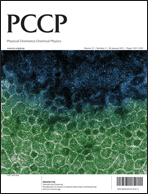Room temperature ionic liquid as solvent for in situ Pd/H formation: hydrogenation of carbon–carbon double bonds
Abstract
This work undertakes mechanistic studies of H+ reduction on a palladium microelectrode in a room temperature ionic liquid. It was found that the electrode was initially in a partially passivated state in [NTf2]− based RTILs and that pre-anodisation of the electrode surface has a dramatic effect on the reversibility of the system, also triggering a change from hydrogen evolution to hydrogen absorption. Theoretical modelling supported the idea of Pd/H formation under these conditions. Utilising Pd/H as an activated hydrogen source, a proof-of-concept method for hydrogenation of multiple bond containing organic molecules by in situ generation of Pd/H via reduction of H+ on palladium in a room temperature ionic liquid has been demonstrated.


 Please wait while we load your content...
Please wait while we load your content...